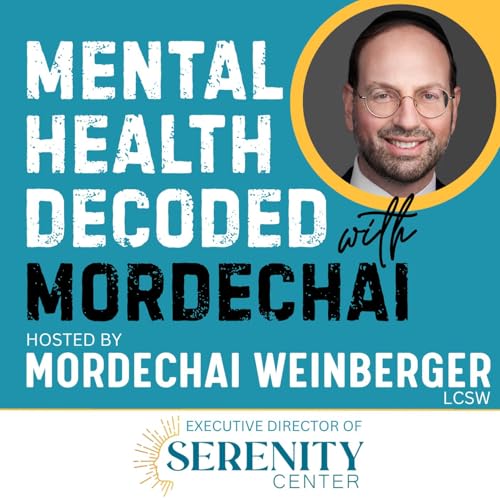
Mental Health Decoded with Mordechai
Failed to add items
Sorry, we are unable to add the item because your shopping cart is already at capacity.
Add to basket failed.
Please try again later
Add to Wish List failed.
Please try again later
Remove from Wish List failed.
Please try again later
Follow podcast failed
Unfollow podcast failed
-
Narrated by:
About this listen
Mental Health Decoded is a one-of-a-kind, live call-in podcast created for the Frum community, where listeners can ask real mental health questions on air and receive practical, compassionate guidance in real time.
Hosted by Mordechai Weinberger, LCSW, this Frum-friendly program provides a safe and respectful space to explore meaningful topics like self-esteem, anxiety, parenting, trauma, OCD, depression, and more — all through the lens of Torah values and clinical insight.
Join us — one question, one insight, one podcast at a time.
Yaakov Brown
Episodes
-
 Jan 28 20261 hr and 19 mins
Jan 28 20261 hr and 19 minsFailed to add items
Sorry, we are unable to add the item because your shopping cart is already at capacity.Add to basket failed.
Please try again laterAdd to Wish List failed.
Please try again laterRemove from Wish List failed.
Please try again laterFollow podcast failed
Unfollow podcast failed
-
 Jan 28 20261 hr and 1 min
Jan 28 20261 hr and 1 minFailed to add items
Sorry, we are unable to add the item because your shopping cart is already at capacity.Add to basket failed.
Please try again laterAdd to Wish List failed.
Please try again laterRemove from Wish List failed.
Please try again laterFollow podcast failed
Unfollow podcast failed
-
 Jan 14 20261 hr and 14 mins
Jan 14 20261 hr and 14 minsFailed to add items
Sorry, we are unable to add the item because your shopping cart is already at capacity.Add to basket failed.
Please try again laterAdd to Wish List failed.
Please try again laterRemove from Wish List failed.
Please try again laterFollow podcast failed
Unfollow podcast failed
No reviews yet
In the spirit of reconciliation, Audible acknowledges the Traditional Custodians of country throughout Australia and their connections to land, sea and community. We pay our respect to their elders past and present and extend that respect to all Aboriginal and Torres Strait Islander peoples today.


